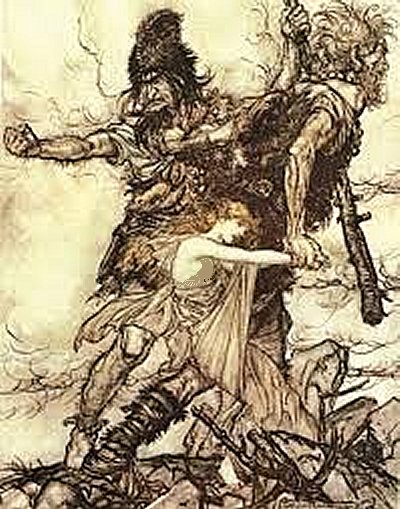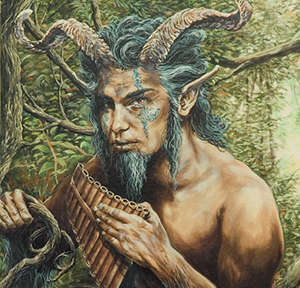 |
SPIRIT
LODGE
LIBRARY
Myth
& Lore
Page
38
|
(Main
Links of the site are right at the bottom of the page)
Some of the 86 pages in this Myth & Lore section are below.
The rest will be found HERE
Pan
By CinnamonMoon

*Denise Linn/The Secret Language
of Signs: Pan was the Greek god of shepherds and hunters who
originated panpipes. This sign symbolizes joy in nature. Is
this the time to step into the joy that comes from being in
nature?
*Wordsworth/Dictionary of Phrase
and Fable:
Pan is Greek for "all, everything". In Greek mythology,
the god of pastures, forests, flocks, and herds; also the universal
deity. Another more probable etymology is that the name is derived
from the same root as Lat. pascere, to graze. His parentage
is variously given as born of Jupiter and Calisto, Hermes and
Penelope, etc. , and he is presented with the upper part of
a man and the body and legs of a goat. His lustful nature was
a characteristic and he was the symbol of fecundity. "Universal
Pan, Knit with the Graces and the Hours in dance. Led on the
eternal spring." Milton: Paradise Lost, IV, 266.
Legend has it that at the time of
the Crucifixion, just when the veil of the Temple was rent in
twain, a cry swept across the ocean in the hearing of a pilot,
"Great Pan is Dead", and at the same time the responses
of the Oracles ceased forever. (See E. B. Brownings poem of
this name.) It has been suggested that what the mariner heard
was a ritual lamentation in honor of Adonis.
*Barbara G. Walker/The Woman's
Encyclopedia of Myths and Secrets:
Pan's name has been derived from paein, "pasture";
it was also the word for "all" and for "bread,"
recalling various All-fathers who were gods of divine bread,
such as Osiris, Adonis, and Tammuz. Like them, Pan was a sacred
king who died in fertilizing the earth. The ritual phrase "Great
Pan is dead" seems to have been taken from the rites of
Tammuz; it was also understood as Thamus Pan-megas Tethnece,
"All-great Tammuz is dead."
King of Arcadian satyrs, the horned
and hoofed woodland god par excellence. Pan was one of the oldest
gods in Greece, associated with the cult of Dionysus and sometimes
identified with him. Pan was said to have coupled with all the
Dionysian Maenads. In addition, he was mated to Athene, Penelope,
Selene, and many archaic forms of the Great Goddess.
Greeks claimed the Egyptian solar
god Amon-Ra was the same as Pan. They called Amon-Ra's holy
city Panopolis, "City of Pan," saying it was inhabited
by "Pans and satyrs." The panoply (ceremonial dress
and decoration) derives from holy processions in the City of
Pan. Other words connected with Pan's cult are caper, caprice,
and capriccio, all from Latin caper, the goat. Pan's sacred
drama of death and resurrection was the original "tragedy,"
from Greek tragoidos, "Goat Song." The word "panic"
was originally the terrible cry of Pan, who dispersed his enemies
with a magic yell that filled them with fear and took away all
their strength. It may be that
Pan's legend began with the Hindu fertility god Pancika, consort
of one of the primal Mother-goddesses, many-breasted Hariti,
who suckled hundreds of pre-Vedic animal spirits as many-breasted
Diana suckled the woodland beasts, whose king Pan was.
Pan was an important model for medieval
pagans' Horned God, whom the church called Satan. The devil
always displayed Pan’s attributes of goat-hoofs, horns,
and unremitting lust; sometimes also a goat head and an attendant
throng of satyrs (demons). Yet the new romanticism of the 19th
century laid aside the demonic nature attributed to Pan only
a few centuries previously and made him a gentle image of the
lost Arcadia populated by shepherds and nymphs. Romantic poets
adopted Pan as their wildwood god.
In 1821, Shelly wrote to his
friend Tomas J. Hogg:
"I am glad to hear that you do not neglect the rites of
the true religion. Your letter
awoke my sleeping devotion, and the same evening I ascended
alone the high mountain behind my house, and suspended a garland,
and raised a small turf-altar to the mountain-walking Pan."
Oscar Wilde wrote wistfully:
"O goat-foot god of Arcady! This modern world hath need
of thee!"
Byron wrote a regretful ode on
the passing of Pan:
"The Gods of old are
silent on their shore
Since the great Pan expired, and through the roar
Of the Ionian waters broke a dread
Voice which proclaimed "the mighty Pan is dead."
How much die with him! false or true--the dream
Was beautiful which peopled every stream
With more than finny tenants, and adorned
The woods and waters with coy nymphs that scorned
Pursuing Deities, or in the embrace
Of gods brought forth the high heroic race
Whose names are on the hills and o'er the seas.
This is from Yasmine Galenorn's
book, Embracing the Moon.
The Horned God
The Horned God is probably the best-known aspect of the pagan
God. He is Lord of the Animals, virile consort of the Goddess.
He is known as the Challenger, the Hunter, the Horned One, and
He is also Master of the Wild Hunt. He stands in the forest,
waiting with glowing ruby eyes and erect phallus. He is the
howling of the wild wind and He dies with the corn harvest,
making His way into the Underworld where He takes His place
as Lord of the Dead.
He leads His Hunt across the land
at night, the hounds racing forward, catching any who stand
in their path. In Norse tradition, the Wild Hunt is a spectral
phenomenon in which Wooden (Odin) leads a band of the dead across
the night sky. In Celtic tradition it is Herne, or Cernunnos,
who masters the Hunt.
The Horned God is traditionally antlered,
whether it be stag or goat horn. He is seen as playful and wry.
One does well not to enter His forests without permission and
certainly, you won't do anything to harm His woodlands.
No discussion of the Horned God's
aspects would be complete without discussing the Piper. Pan
is the God of shepherds, flocks, the woods and of hunting. He
is also a God of fertility and music. The goat-God inspires
ecstasy and passion. The fact that He is half-goat and half-human
indicates the dual nature of humanity: both cerebral and carnal.
Both aspects are complimentary, we do not rid ourselves of one
in order to attain the other. Pan is also a God of fear and
awe—we derive the word panic from His name. He does not
just skip around the fields all day, piping happy music. He
takes what he wants and has ravished the nymphs who share the
forests with him. He is the Rut Incarnate.
|
|
|
|
|
|
|
|
|
|
|
|
Libraries
are on this row
|
|
|
INDEX
Page 3
(Main Section, Medicine Wheel, Native Languages &
Nations, Symbology)
|
|
INDEX
Page 5
(Sacred Feminine & Masculine, Stones & Minerals)
|
|
|
|
|
|
|
©
Copyright: Cinnamon Moon & River WildFire Moon (Founders.)
2000-date
All rights reserved.
Site
constructed by Dragonfly
Dezignz 1998-date
|
|